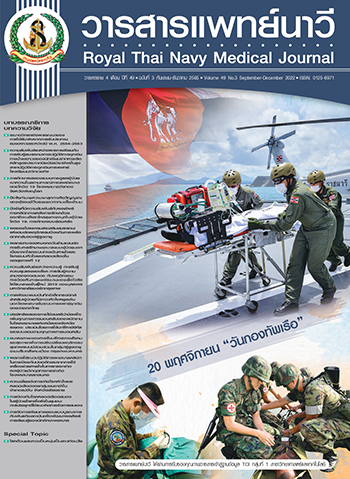The scenarios of Social and Health Service Management for Participatory Health Behavior Modification of Older Adults among Urban Community in Bangkok
Main Article Content
Abstract
This study was a mixed method research to assess the need for social and health service management for health behavior modification and study the scenarios of social and health service management for participatory health behavior modification of older adults among urban community in Bangkok. The quantitative data group were 1,340 participants and the qualitative data group were 93 participants.The research instrument consisted of questionnaire, semi-structured and focus group interview form. The content validity were between 0.60 - 1 and the reliability of total scale questionnaire was 0.85. The data were then analyzed by using percentage, mean and standard deviation. The results showed that the needs for urgent development consisted of 3 aspects.hysical well-being aspect which was providing transportation to hospital for treatment and alternative medical systems (PNIModified = 0.78 and 0.54) respectively. Second, social well-being aspect which was to facilitate access to health care services (PNIModified = 0.73) and third, spiritual well-being aspect which was to organize the preparation activities for physiological changes by age (PNIModified = 0.58). The scenario of social and health service management must integrate the needs and development processes which consisted of the improvement health care competency that cover all levels and create an environment that enable health behavior modification such as providing health services to promote health care of older adults, collaboration, participation, social support and communication channel.
Therefore, the provision of social and health services to change health behaviors of older adults requires need assessment and integration of necessary skills together with creating an environment conducive to sustainable change in health behavior.
Article Details

This work is licensed under a Creative Commons Attribution-NonCommercial-NoDerivatives 4.0 International License.
References
United Nations Population Fund. Aging in the twenty-first century: a celebration and a challenge. New York: The United Nations Population Fund; 2012.
Foundation of Thai Gerontology Research and Development Institute (TGRI). Annual report of the Thai elderly 2021. Nonthaburi. National Board of Elderly; 2021. (in Thai).
Thaithae S, Thanaboonpuang P, Mahaprom T. Factors affecting health care behaviors of the elderly among urban community in Bangkok. Royal Thai Navy Medical Journal. 2020;48(2):393-406. (in Thai).
National Statistical Office. Survey of the elderly population in Thailand 2021. [Internet]. [cited 2022 October 22] Available from: http://www.nso.go.th. (in Thai).
Apiratnanok W, Jungyoudee Y. Let's move together towards a active aging society. [Internet]. [cited 2019 October 18]. Available from: https://www.hsri.or.th/people/media/care/detail/5737. (in Thai).
Public Health and Environmental Strategy Division. Summary of the Bangkok Metropolitan area elderly database. [Internet]. [cited 2019 October 18] Available from: http://www.bangkok.go.th/hesd/page/main/1686. (in Thai).
The Office of Health Strategy Administration, Thai lifestyle. Draft regulations of the Prime Minister's Office on District Health Board, 2017. [Internet]. [cited 2018 February 14] Available from: http://thlp.ops.moph.go.th/pdf. (in Thai).
Kumkong M, Suwanaraj M, Saetiew S. Food and nutritional management model for older adults using the mother’s food guideline: a case study of the elderly club, Boromarajonani College of Nursing Songkhla. The Southern College Network Journal of Nursing and Public Health. 2018;5(3):53-68. (in Thai).
Sommung P, Sakulkim S, Jitsophakul N, Phimsan C, Jareonpol O. Effects of home exercise on exercise behavior and physical fitness among elderly in Khunpadpeng sub-district municipality, Suphanburi province. Journal of Health Education. 2019;42(1):43-54. (in Thai).
Nimitarnun N, Klinhom W, Wattakiecharoen J, Thipkaew C. The development of fall prevention model of the elderly through community participation. Journal of The Royal Thai Army Nurses. 2020;21(2):389-399. (in Thai).
Wongwanich S. Needs assessment research. Bangkok: Chulalongkorn University Printing House;2007. (in Thai).
Corday D. An assessment from the policy perspective. In: Wachter K, Strat M. The future of meta-analysis. New York: Sage; 1990. p. 99-120.
Gaber J. Meta-needs assessment. Evaluation and Program Planning 2000;23(2):139-47.
Green LW, Kreuter MW. Health program planning an educational and ecological approach. New York: Quebecor World Fairfield; 2005.
Pearse AC, Stiefel M. Inguiry in participation: a research approach in UNRISD participation programme. Geneva: United Nations Research Institute for Social Development; 1979.
Department of Older Persons. Measures to implement national agenda on aged society: 6 sustainable 4 change. [Internet]. [cited 2019 April 10] Available from: http://www.dop.go.th/download/knowledge/th1551432930-155_0.pdf. (in Thai).
Wongwanich S. Alternative strategies for developing research and evaluation culture and capability of professional teachers as a change agent for driving to knowledge-based schools: a complete needs assessment research. Journal of Research Methodology 2005;18(2):193-211. (in Thai).
Bilhmat P, Pothong P, Lemso W, Kaewsod S, Dongnadeng HA. The needs for health care among the elderly in the Trang Municipality area of Trang province. Journal of Humanities and Social Sciences SKRU 2020;2(1):29-50. (in Thai).
Nutbeam D. Defining, measuring and improving health literacy. Health Evaluation and Promotion 2015;42:450-5.
Sorensen K, Van den Broucke S, Fullam J, Doyle G, Pelikan J, Slonska Z, et al. Health literacy and public health: a systematic review and integration of definitions and models. BMC Public Health 2012;12:80.
Karimy M, Koohestani Hr, Araban M. The association between attitude, self-efficacy, and social support and adherence to diabetes self-care behavior. Diabetol Metab Syndr 2018;10:86.
Kwanjaroensub S, Suwannapong N, Tipayamongkholgul M, Manmee C. Health need assessment and accessibility to health services of rural elderly in Wihandaeng district, Saraburi province. Royal Thai Navy Medical Journal 2019;46(1):214-30. (in Thai).
Fivecoat HC, Sayers SL, Riegel B. Social support predicts self-care confidence in patients with heart failure. Eur J Cardiovasc Nurs 2018;17(7):598-604.

